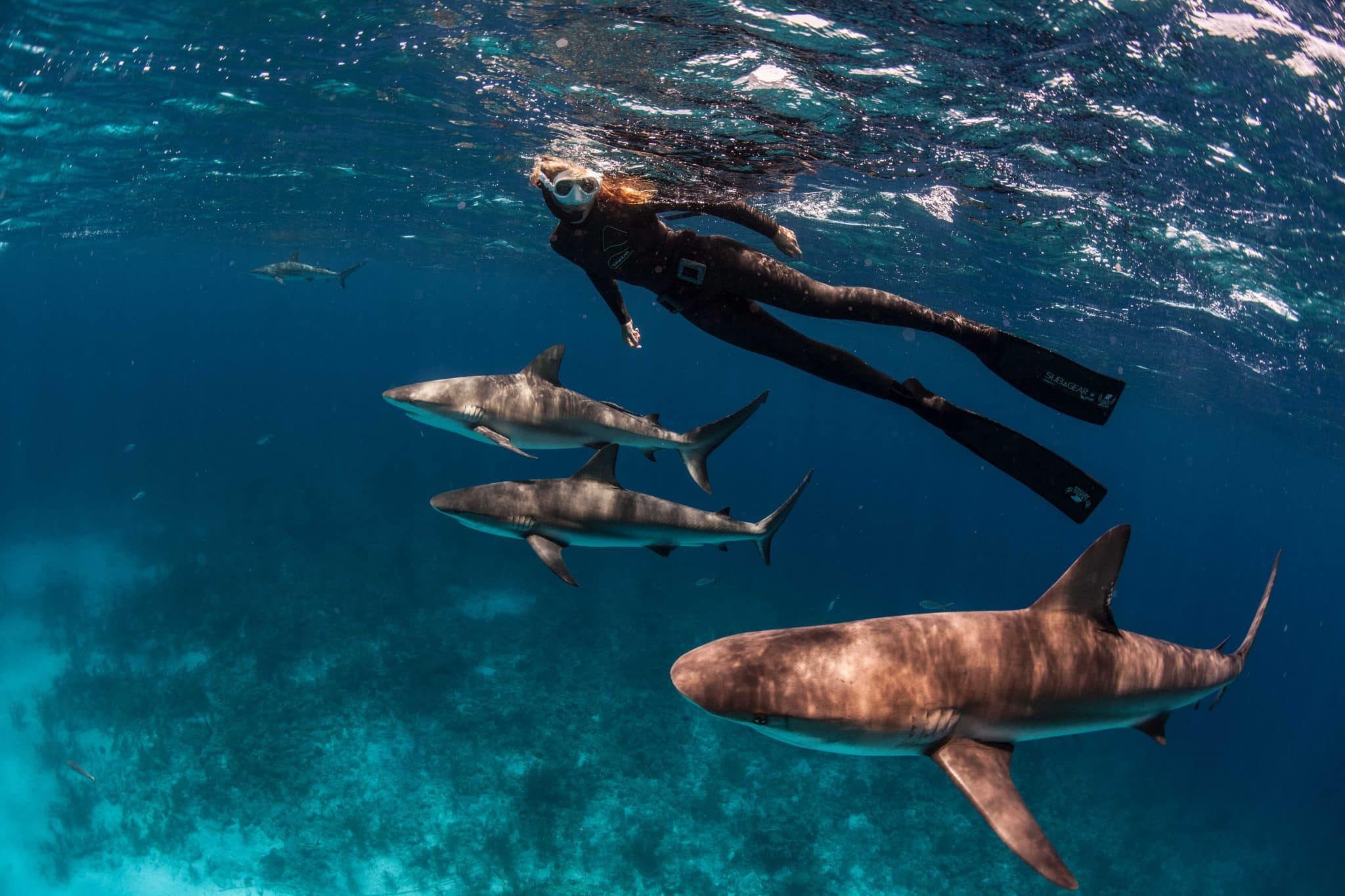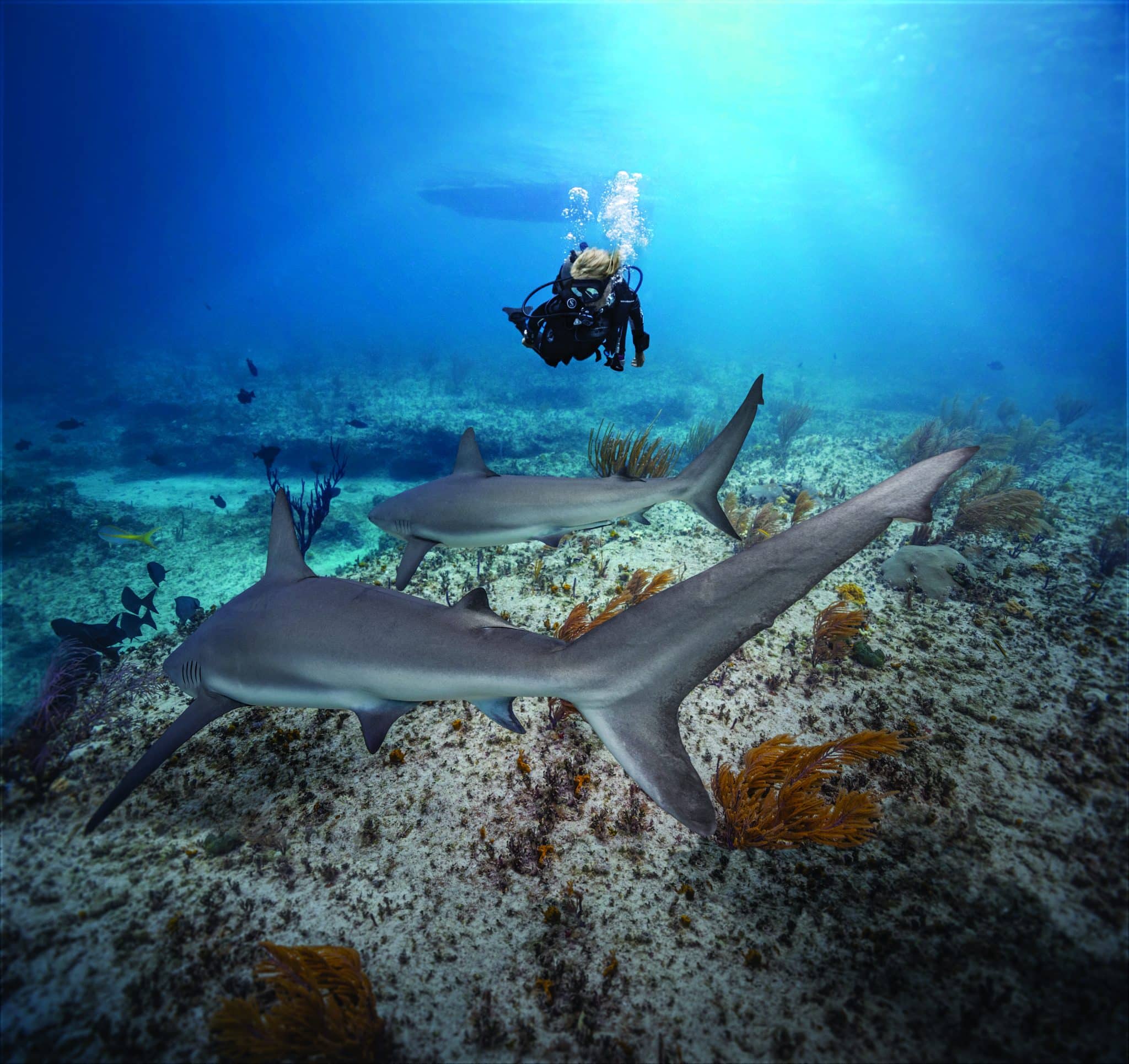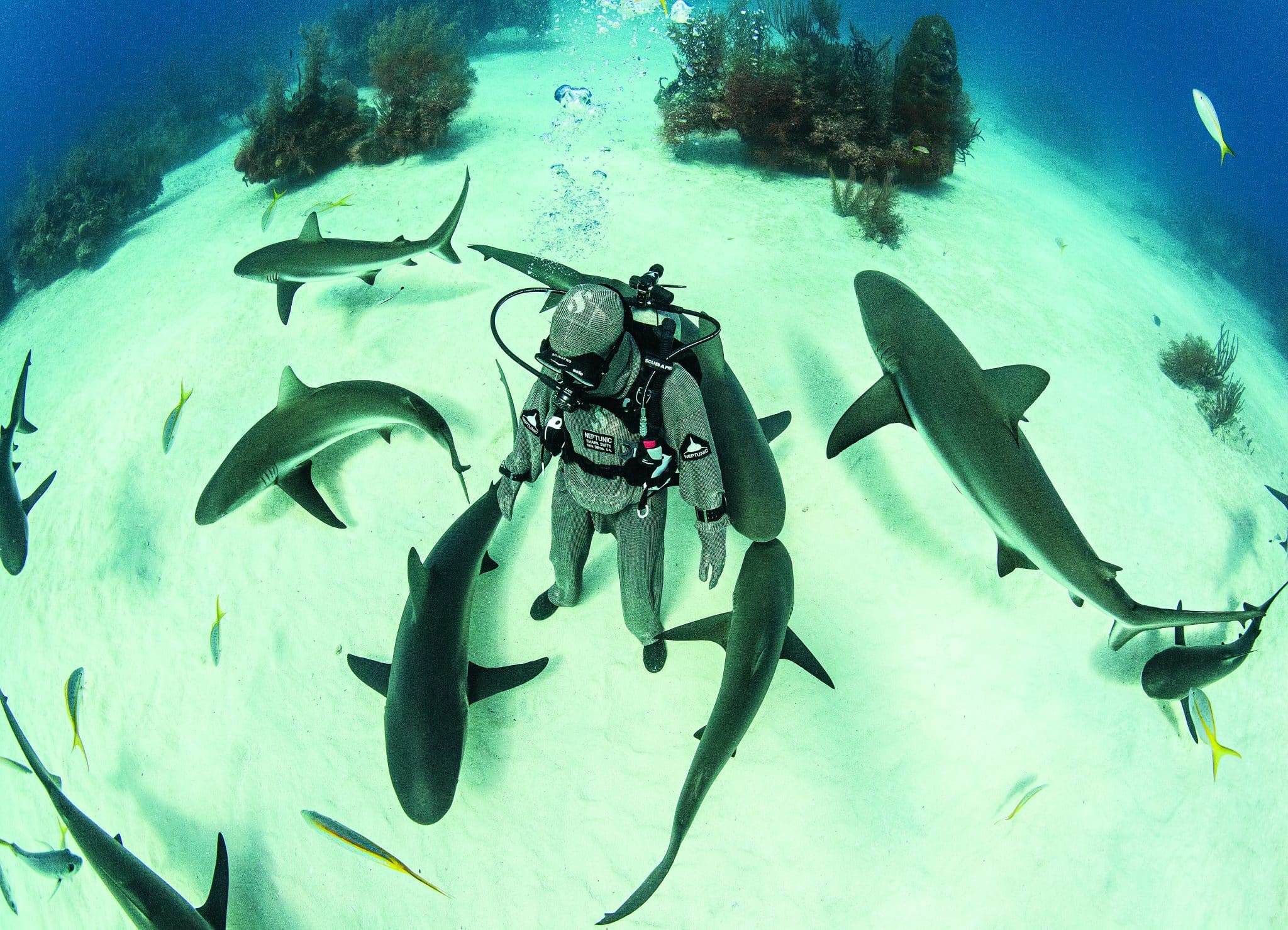Marine Life & Conservation
PADI to play major role at CITES 2022 this week

PADI®, with its global charitable foundation PADI AWARE™, is continuing to drive positive ocean change by mobilising the dive community to save sharks. The value of sharks and rays to the global economy is likely to be a significant factor when governments decide whether to impose trade restrictions on dozens of threatened shark species at the 2022 Convention on International Trade of Endangered Species of Flora and Fauna (CITES) meeting in Panama over the coming days.
PADI has been asked by the home nation of Panama to provide specialist advice to all attending government representatives to help secure support for a critical vote to double the amount of protected shark and ray species.
PADI CEO + President and PADI AWARE FoundationTM Chairman of the Board, Drew Richardson sent letters of support to governments that have already backed the proposal to protect all species of requiem sharks from unsustainable trade, including the President of Panama, the proposal’s lead country. With the organisation having already established itself as the most successful diving organisation to mobilise divers in protecting sharks, PADI and PADI AWARE Foundation will be representing the diving community at CITES, ensuring divers’ concerns, as well as value to many economies, are taken into account by decision-makers.
Most recently, collaborative efforts resulted in a successful campaign for the highly-applauded immediate two-year ban on catching and retaining Atlantic shortfin mako sharks at the last meeting of the International Commission for the Conservation of Atlantic Tunas (ICCAT).
“The invitation to advise governments from the host nation of Panama at CITES as a result of PADI’s letter of support has highlighted just how impactful taking direct action for the ocean can be when it comes to pushing the needle for creating positive ocean change,” says Ian Campbell, PADI AWARE Foundation, Associate Director of Policy and Campaigns.
Saving sharks, which are keystone species and apex predators, is an integral part of PADI’s Blueprint for Ocean Action, with the established goal of reducing the number of sharks and rays facing extinction by 25% in the next decade. To date, PADI has already helped secure protection measures for 51 species of sharks and rays, with the goal of protecting 54 more in the next three years.
“Sharks are critical to our world’s largest and most important ecosystem, keeping our oceans in healthy balance for more than 450 million years,” continues Campbell. “Over a third of all species of sharks and rays are facing extinction in our lifetime. PADI is taking action by representing our passionate community of Ocean Torchbearers at international arenas like CITES where real-life decisions are made.”
CITES is a United Nations agreement that is binding in 184 countries and limits the international trade of identified animals at risk, including sharks. There are currently 46 marine species and 23 freshwater species protected under CITES. This year, the governments in attendance are voting on the protection of over 50 species of sharks—from grey reef sharks to lemon sharks. Two-thirds of the government delegates at CITES need to vote “YES” for these species to be placed on the CITES protectee list, which will put restrictions on international trade for fins, meat, and any other shark products.
“This CITES meeting is turning out to be one of the most important for sharks ever. The proposals put forward include most of the species that make up the shark fin trade, and that attract tourists to dive sites all over the world” explains Campbell. “CITES only comes around once every three years, so we must grab this opportunity before these sharks disappear from our favourite spots forever.”
To ensure that sharks get the “YES” vote for protection, PADI is encouraging their global community of 128,000 PADI Professionals, 6,600 PADI Dive Centers and Resorts, and the over 29 million certified PADI Divers to help take part and urge their own local governments to take action at CITES.
PADI is asking all torchbearers (whether a diver or not) who are passionately committed to our shared blue planet and creating positive ocean change to sign the petition that urges governments to vote “YES”.
PADI is also asking all PADI Members to sign the PADI Dive Center Business Support Letter for Shark Protection, which will be formally sent to all government delegates in attendance at CITES.
To help build a swell of support for delegates voting “YES” to protect sharks, PADI is also calling on everyone to share the shark signer petition using hashtags #CITES4Sharks and #Divers4Sharks, social tags @PADIAWARE and @PADITV, and government tags @s_guilbeault, @BarbaraCreecy_, and @tanya_plibersek.
To learn more about how to take action to help sharks get the global protection they need and deserve, visit www.padi.com/aware/cites.
Photos: Neil Andrea and @juliesharkangel
Marine Life & Conservation
Paul Watson Released as Denmark Blocks Japan’s Extradition Bid

Renowned anti-whaling activist Paul Watson has been released from custody in Greenland after spending five months in detention. Denmark’s Justice Ministry rejected Japan’s request for his extradition, citing insufficient guarantees that his time already served in custody would be credited against any potential sentence.
The 74-year-old Canadian-American was arrested on July 21 in Nuuk, Greenland’s capital, when his ship docked to refuel. His arrest was based on a 2012 Japanese warrant related to a 2010 encounter in Antarctic waters. Japan alleged Watson obstructed operations and caused damage to a whaling research ship during efforts to disrupt illegal whaling. Watson has consistently denied these claims, maintaining his commitment to marine conservation.
Denmark, which oversees extradition matters for Greenland, concluded that while the legal conditions for extradition were met, the lack of assurances from Japan regarding time-served credit made extradition untenable.
In a video shared by his foundation, Watson expressed gratitude and relief, saying, “After five months, it’s good to be out… and good to know they’re not sending me to Japan.” He added that the most difficult part of his time in custody was being separated from his two young sons.
Watson is a pioneering figure in marine conservation, known for founding the Captain Paul Watson Foundation in 2022 after decades of activism with the Sea Shepherd Conservation Society. His bold efforts to defend marine life have earned him widespread support, including from celebrities and conservationists. His work has also been featured in the acclaimed reality TV series Whale Wars.
Watson’s lawyer, Jonas Christoffersen, praised the decision, stating, “We are happy and relieved that Paul Watson is now free.” He added that Watson is eager to reunite with his family and continue his vital work.
The arrest occurred while Watson’s vessel, the M/Y John Paul DeJoria, was en route to the North Pacific with a team of 26 volunteers to intercept a Japanese whaling ship. His foundation described the arrest as politically motivated and emphasized that Watson’s actions were focused on ending illegal whaling practices.
Japan resumed commercial whaling in 2019 after leaving the International Whaling Commission, asserting that whale meat is a cultural tradition. Conservationists, however, continue to challenge these practices, highlighting their impact on marine ecosystems.
Despite the challenges, Watson remains steadfast in his mission to protect marine life and bring attention to whaling practices. His dedication to ocean conservation has made him a globally respected advocate for the environment.
Marine Life & Conservation
12 Days of Zero-Waste Fish-mas

This holiday period, the Marine Conservation Society, the UK’s leading ocean membership charity, invites you to make some simple changes to eating fish this Christmas to help our seas.
Dr Kenneth Bodles, Head of Fisheries and Aquaculture at the Marine Conservation Society, said, “During the festive season, our consumption increases, but so does waste. Sustainability isn’t just about where food comes from – it’s also about how you use it. By reducing waste and making the most out of your seafood, you’re not only taking steps to be more ocean-friendly, but can also help to cut costs during what is often one of the most expensive times of the year”.
The Marine Conservation Society has compiled twelve tips on how to consume seafood sustainably with zero-waste this Christmas:
Buy whole fish instead of fillets
Instead of fillets, consider buying whole fish such as salmon, hake, or lemon sole. By adopting a “nose to tail” approach with cooking, whole-baked fish not only feeds a crowd, but also helps to minimise waste and maximise sustainability by using up every part of the animal, including bones, skin, and fat.
Make fish stock
Leftover fish bones or shells can be put to good use by boiling them to make a nourishing fish stock or bisque. This can be frozen and preserved for later use and makes for a flavourful base in a soup.
Make your own fish pâté
Avoid waste by turning leftover fish, such as smoked mackerel or salmon, into a delicious pâté by blending with cream cheese and lemon. Perfect when paired with crackers.
The sustainability of salmon and mackerel varies depending on where and how it is caught or farmed. For more information on green-rated options, check the charity’s Good Fish Guide.
Buy frozen
By purchasing seafood that is frozen or vacuum-packed, this helps to reduce waste by extending the shelf life of your food.
Fish pie
If you’re wondering what to do with leftover cooked fish, why not opt for a classic fish pie with mashed potatoes, leeks, and a cheesy sauce? A sure crowd pleaser on Boxing Day.
Use the head
Don’t forget the fish head! The meat is incredibly tender and flavourful. The charity recommends a cod’s head curry or recreating Fallow’s renowned cod’s head in siracha butter.
By stretching your ingredients further, not only is this a more sustainable way to enjoy seafood, but also cost-effective by repurposing leftovers and cooking creatively.
Boxing Day brunch
Mix leftover kippers or smoked salmon with scrambled eggs for a tasty, zero-waste, Boxing Day brunch.
For best choice, make sure you buy kippers, or herring, from the North Sea and the North Irish Sea.
Zero-waste storage
A top tip from the Marine Conservation Society to avoid waste is freezing fish offcuts to save for future use.
Crisp up the skin
Even leftover fish skin can be turned into a quick savoury snack by crisping it up in an air fryer with a little olive oil and salt.
Anchovies two ways
Leftover anchovies can either be blended with butter to make a delicious anchovy butter or tossed into pasta for a hit of umami flavour.
The charity recommends opting for anchovies caught in the Bay of Biscay for best choice.
Fishcakes
For an easy, zero-waste meal, leftover seafood trimmings can be mixed with mash and fried in breadcrumbs to make fishcakes.
Pickled mussels
Try pickling mussels in 1:1 vinegar and water, with a dash of sugar for a sustainable, zero-waste snack that can be enjoyed well beyond the festive season.
Mussels farmed in the UK are a seafood superhero. Grown using low-impact methods and harvested by hand, they get all the food they need from the sea around them. This makes them one of the most sustainable, ocean-friendly, and cost-effective seafood options.
Players of People’s Postcode Lottery have raised £6.6M towards the Marine Conservation Society’s vital work in making seafood more sustainable.
Laura Chow, Head of Charities at People’s Postcode Lottery, said: “Fish is a festive favourite for many, but making sustainable choices when it comes to how we buy and eat seafood makes all the difference for our ocean. Support from players of People’s Postcode Lottery has helped the Marine Conservation Society further its sustainable seafood work, so that we can all enjoy healthier, better protected seas.”
The Marine Conservation Society encourages you to make sustainable seafood choices a year-round habit, not just for Christmas. To check how sustainable the seafood on your plate is, you can visit the charity’s Good Fish Guide. The Guide helps consumers and businesses identify the most sustainable seafood using a simple traffic light system, based on where and how species are caught or farmed. Green is the best choice, amber means improvements are needed, and red indicates fish to avoid buying.
Zero-waste gift idea
Why not embrace a zero-waste Christmas by gifting a membership to support marine conservation? It’s a meaningful, low-waste gift that helps protect our ocean for generations to come. Memberships start from as little as £5 a month – the price of a sandwich and drink from your local coffee shop.
Find the latest sustainable seafood advice for wild-caught and farmed seafood on the Good Fish Guide, downloadable to your phone from www.mcsuk.org/goodfishguide.
-

 News2 months ago
News2 months agoIconic SS United States to become the World’s Largest Artificial Reef
-

 News3 months ago
News3 months agoBook Review – 52 Assignments: Underwater Photography
-

 Gear News3 months ago
Gear News3 months agoDYNAMICNORD – New German diving brand enters the British market
-

 News3 months ago
News3 months agoExploring Cenote El Pit: A Diver’s Dream
-

 Gear News3 months ago
Gear News3 months agoTry BARE drysuits (and maybe even win one!) this Friday with Sea & Sea at North West Dive Fest
-

 Marine Life & Conservation3 months ago
Marine Life & Conservation3 months agoBook Review: Coral Triangle Cameos
-

 Blogs2 months ago
Blogs2 months agoDive the Egyptian Red Sea this Autumn with Regaldive
-

 News3 months ago
News3 months ago2024 Ocean Art Underwater Photo Competition Announced

















